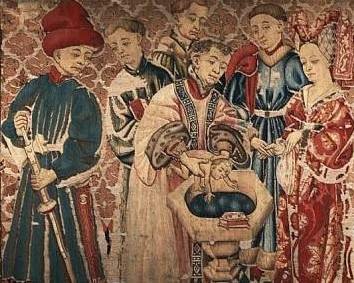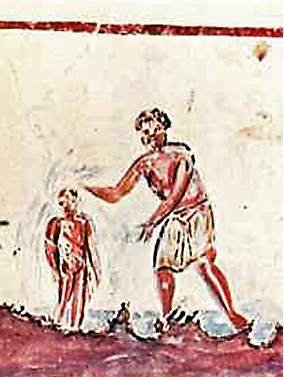
Is Baptism the “circumcision of Christ” that Paul was referring to in Colossians 2:8-15? It is a question that has far-reaching implications. Here is a little Scripture study I whipped up a few days ago.
See to it that no one makes a prey of you by philosophy and empty deceit, according to human tradition, according to the elemental spirits of the universe, and not according to Christ. For in him the whole fulness of deity dwells bodily, and you have come to fulness of life in him, who is the head of all rule and authority. In him also you were circumcised with a circumcision made without hands, by putting off the body of flesh in the circumcision of Christ; and you were buried with him in baptism, in which you were also raised with him through faith in the working of God, who raised him from the dead. And you, who were dead in trespasses and the uncircumcision of your flesh, God made alive together with him, having forgiven us all our trespasses, having canceled the bond which stood against us with its legal demands; this he set aside, nailing it to the cross. He disarmed the principalities and powers and made a public example of them, triumphing over them in him. (RSVCE)
8a. “See to it that no one makes a prey of you by philosophy and empty deceit, according to human tradition [τὴν παράδοσιν τῶν ἀνθρώπων, lit. the traditions of men]…” — this is the exact phrase that Jesus used in Mark 7:8. In the context of Paul’s teachings against the heresy of the Judaizers — that it is by faith that we are saved, not by circumcision or by other observances of the Torah, as the Judaizers preached (Romans 3:28, Galatians 2:16, Ephesians 2:8-10, etc.) — and its resolution at the Council of Jerusalem (Acts 15) — and in the context of the rest of this passage regarding circumcision, Paul’s reference is clear: He reminds the Gentile Christians of Colosse that it is faith, not the bodily circumcision of the Jews, that saves them, as some were no doubt still teaching.
8b. “…according to the elemental spirits of the universe [κατὰ τὰ στοιχεῖα (stoicheia) τοῦ κόσμου], and not according to Christ.” — Paul is speaking here against the teachings of the Stoic philosophers, which were then in vogue — and which were just as empty as any other “traditions of men.”
9–10. “For in him the whole fulness of deity dwells bodily [σωματικῶς (somatikos)], and you have come to fulness of life [lit. you have been filled up] in him, who is the head of all rule and authority.” — How are we filled up?

11a. “In [Christ] you were circumcised with a circumcision made without hands — by putting off the body [τοῦ σώματος (somatos)] of flesh [τῆς σαρκός (sarkos)]…” — We are filled up with life, by Him, in whom the fullness of deity dwells bodily, he circumcising us with a circumcision made without hands — by putting off the body of flesh. Clearly this circumcision, though it is made without hands, has something to do with our bodies, and with Christ’s Resurrection and bodily life.
11b–12a. “…in the circumcision of Christ; and you were buried with him in baptism” — It is important to note that there is no “and” here in the Greek, nor is there a semicolon (the biblical Greek manuscripts had no punctuation). Rather, Paul leads directly into a participle, συνταφέντες (suntaphentes), “having been buried.” A more literal translation of this verse is [see the NASB, known for its literalness, which translates it this way] “In him also you were circumcised with a circumcision made without hands, by putting off the body of flesh by means of the circumcision of Christ, having been buried with Him in Baptism…” The Greek is absolutely clear, even if the English fails to get the point across. The “circumcision of Christ” is Baptism.
12b. “…in which you were also raised with him through faith in the working of God, who raised him from the dead.” — We died and were buried with Christ in Baptism, and are raised together with him through faith in the working of God. Compare Romans 6:3-4: “Do you not know that all of us who have been baptized into Christ Jesus were baptized into his death? We were buried therefore with him by baptism into death, in order that, just as Christ was raised from the dead by the glory of the Father, we too might walk in newness of life.” — Putting it all together: We are filled up with life by Christ, through a circumcision made without hands, the circumcision of Christ, by which we put aside the body of the flesh, the body of the flesh having been buried with Christ in Baptism, and we being raised to a new, regenerated life in Him.
As if it weren’t already crystal clear enough, Paul continues to emphasize the point:

13a. “And you, who were dead in trespasses and the uncircumcision of your flesh [τῆς σαρκός (sarkos)], God made alive together with him, having forgiven us all our trespasses…” — We were dead in the uncircumcision of our flesh, and we were made alive together with Him, through Baptism (in which we are “raised together with Him”), having forgiven us all our trespasses (cf. Acts 2:38a, “Repent and be baptized every one of you in the name of Jesus Christ for the forgiveness of your sins“). By this circumcision of Christ, which is Baptism, He redeemed us who were under the Law (Galatians 3:27, 4:1), we are now circumcised in our hearts — so that, just as the circumcision of Abraham marked Jews as sons of Abraham, the circumcision of Christ (Baptism) marks us as sons of God (Galatians 4:4-7).
13b. “…having canceled [lit destroyed, obliterated] the bond [lit. certificate of debt] which stood against us with its legal demands [lit. ordinances]; this he set aside, nailing it to the cross.” — Christ obliterated the demands of the Law, the debt we owed under the covenant of Moses, to its ordinances and legalistic observances. Therefore we are no longer under Law (Torah), but under grace (Romans 6:14).
So yes, explicitly, this passage rightly calls Baptism the circumcision of Christ.
And a question for further thought: If circumcision was given to infant boys on the eighth day, and Baptism is the “circumcision of Christ” — should it not also be given to infants?
Just as an interesting comment between two Greek freaks, it’s interesting to note that the participle συνταφέντες (v. 12) is expressing the manner in which the περιετμήθητε (v. 11) is carried out. So you have the clear identification of baptism (the new covenant sign and seal) with circumcision (the old covenant sign and seal).
But what gets passed over by the vast majority of commentators is the fact that the emphasis in the passage is actually not on baptism/circumcision at all, but rather on our union with Christ, which is made amply clear by the repeated use of the phrases ἐν αὐτῷ and ἐν ᾧ, as well as the two uses of the συν prefix in v. 12 (συνταφέντες and συνηγέρθητε).
You’re much sharper with your grammar than I am. I grasped that it connected circumcision and baptism, but I couldn’t have told you how. It seems like that’s an awfully important connection to so easily get lost in translation. And that’s a pretty great observation, regarding εν αυτο (can’t type proper diacritics on my iPad). I might have picked up on that if I’d actually translated the whole passage and not zeroed in on that one little clause.
There’s an even more interesting grammatical feature, that goes a long way towards explaining the difference between the Presbyterian (or Reformed) view of baptism and the view of Rome—the phrase διὰ τῆς πίστεως τῆς ἐνεργείας τοῦ θεοῦ τοῦ ἐγείραντος αὐτὸν ἐκ νεκρῶν, which ends v. 12.
The full idea is that not only is baptism identified with circumcision, but it’s also part and parcel of our union with Christ in His resurrection; but this is true only διὰ τῆς πίστεως.
That’s brilliant. So what is the difference, in English? Baptism is part and parcel of our union with Christ, but only through faith? Certainly we hold, too, that faith is necessary for the Sacrament to work. Do you hold that it’s sacramental?
We would say that baptism is a sacrament, but on that point I think that our definitions of sacrament differ (at least as far as I recall).
And as I recall (again, given my recent foray into my thesis, my memory isn’t up to snuff) I think Rome holds to some form of baptismal regeneration,
Yes, baptismal regeneration: we take Paul literally when he says that in baptism, we are buried with Christ in death and raised to new life in His Resurrection. Being dead in sin, we raised to life in grace. I guess I am not much of a theologian, but is there any middle ground between belief in baptismal regeneration and belief in baptism as a pure symbol and ordinance of obedience?
A Sacrament, in our definition, is a visible, outward sign of an invisible, inward grace. It actually accomplishes what it represents; so Baptism actually washes away our sins and grafts us into the Body of Christ.
Soooo let’s get this straight.. this lonelypilgrim writer claims God’s word is saying water baptism is the circumcision of Christ made without hands …yet someone’s hands are required to be on the baptiz-ee lowering them into the water?? Say whaaat?? Sad how the god of this age has blinded the minds of the unbelieving. I pray God will open the understanding of water baptismal regenerationists everywhere so they can see Rom.6, Col.2, Gal.3, Eph.4 (for starters) refer to the elect in Christ during HIS baptism – crucifixion, death, burial and resurrection (see Luke 12)…otherwise known as the Gospel so they may believe and become born again. A believer’s water baptism is merely a reflection or anti-type of what occurred to their old self during Christ’s baptism unto death (1 Peter 3:21).
Hi, Jeff. Thanks for the comment. My article is a Scripture study of Colossians 2:8-15. I showed in the article that Paul in fact refers to baptism appositively as “the circumcision of Christ.” You’re entitled to your views, but I’d appreciate it if you’d reference the argument I made in the article. Thanks.